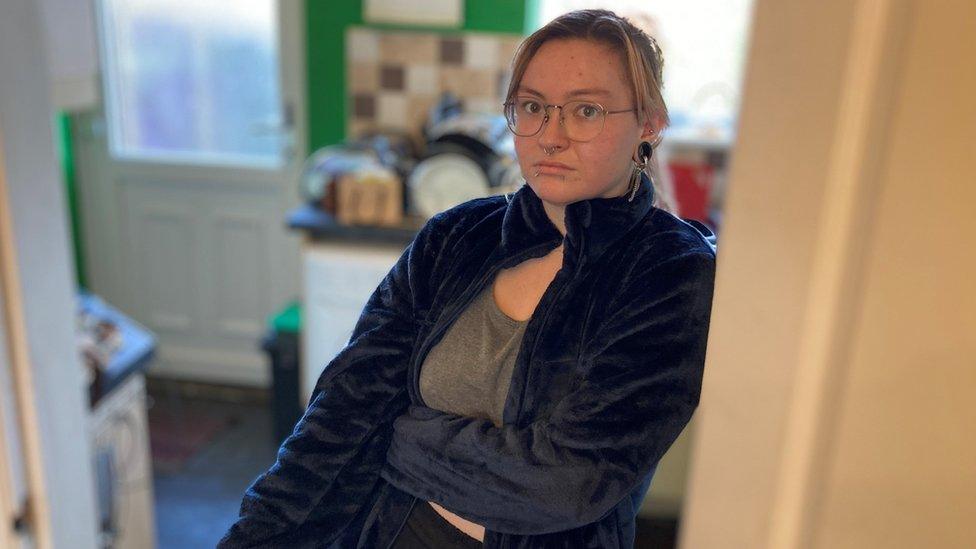Newcastle: Teen who cannot live with dog fears for mental health
- Published

Aisling Gorman is currently living in temporary accommodation provided by Newcastle City Council
A 19-year-old fears their mental health may suffer as they cannot live with their therapy dog due to a lack of suitable housing.
Aisling Gorman, who has severe anxiety and depression, is living in temporary accommodation due to a council shortage of appropriate homes in Newcastle.
Their therapy dog, which has helped with recovery, is unable to live there.
Newcastle City Council said it did not currently have "enough accessible general needs housing."
It said it was facing "an increasing demand" for council and social housing in the city.
Aisling, who uses the pronouns they and them, had been living with their family in a rented house in Fenham.
However, 18 months ago the family was asked to leave by their landlord, who wanted to sell up.
Aisling's mum, Grace, had been given time to find a new property but was later issued with a no-fault eviction notice.
The family had been able to stay in the property while searching for alternative places to live, but was told bailiffs would evict them on 6 December.
Aisling has had therapy dog Mushy for five years
While their mum has found a new home, Aisling wanted to live independently as an adult.
The teenager contacted the council's housing advice centre, but claimed the local authority did not have any suitable places that met their additional needs due to their mental health.
Aisling's therapy dog, Mushy, helps them cope with their anxiety and depression.
Aisling suffered a mental health crisis when they were younger, leaving them bedridden for three years, and the dog was a key part of their recovery.
The temporary accommodation will not allow the animal to be there and it is currently at their mum's home.
'Really scary'
Aisling's condition also means they face difficulties with shared access and communal spaces, and they said the temporary accommodation is therefore not suitable.
"I have a doctor's note which says that is not suitable for my needs," they said.
"There's a very high chance I wouldn't be able to leave my bed again, which is really scary.
"It really does feel like I'm doing the right thing by moving out and finding my own independence. It's just so difficult."
Grace Gorman, who lived in her rented home for over three years, says she felt like "a criminal" having to go to court during the process
Mum Grace Gorman said her own mental health also suffered during the no-fault eviction process.
She had to go to court to apply to delay it by six weeks as she struggled to find a new house.
"Going to court in itself, you feel like a criminal, you feel like you have done something wrong," she told the BBC.
"The stress has been relentless, basically, to a point where I thought 'I can't handle this any more'.
"For me, the thing about bailiffs coming is utterly terrifying. I know I wouldn't cope with that.
"I suppose nobody's at fault, it's just the housing crisis. Landlords are feeling it, we're feeling it."
Their landlord told the BBC the family was given 18 months to leave the property which they needed to sell.
Decision delayed
The government said it was working to abolish no-fault eviction notices - known as a section 21 notice, external - after some tenants accused landlords of using them unfairly.
A decision on abolishing them has been delayed until the court system is reformed.
Newcastle City Council said it had developed a policy of "no evictions into homelessness" with Your Homes Newcastle and Home Group, which last year saw their evictions into homelessness fall from almost 200 a year to just one.
"Where private tenants are facing possession proceedings we provide advice to help the tenant remain in their home, additional housing priority for them to secure alternative accommodation and if this cannot be secured in time we offer temporary accommodation", it said.
If you're affected by any of the issues in this article you can find details of organisations who can help via the BBC Action Line.
Follow BBC Newcastle on Facebook, external, X (formerly Twitter), , externaland Instagram, external. Send your story ideas to northeastandcumbria@bbc.co.uk, external
Related topics
- Published30 November 2023
- Published23 November 2023
- Published15 October 2023
- Published16 October 2023
- Published24 October 2023
- Published17 May 2023